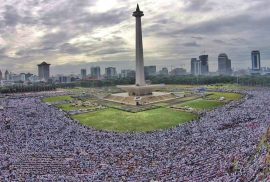Aksi Super Damai 212 patut diapresiasi sebagai bukti kemajuan dan kedewasaan umat Islam Indonesia dalam mengekspresikan aspirasi politiknya. Kesejukan yang hadir dalam aksi ini sudah seharusnya diapresiasi.
Namun demikian, bagi peserta aksi, tujuan mereka bukan sekadar membuktikan bahwa Aksi Bela Islam adalah gerakan damai. Ratusan ribu atau bahkan lebih dari sejuta orang bersusah payah mendatangi Jakarta dalam aksi 212. Sebagian bahkan rela jalan kaki berhari-hari demi “membela Islam”, dengan tuntutan memenjarakan Ahok. Menariknya, meskipun Ahok tidak ditahan, para peserta aksi 212 tampak pulang dengan perasaan menang.
Sampai esai ini ditulis, perayaan kemenangan masih berlanjut. Linimasa masih dibanjiri konten dan unggahan yang menunjukkan kedahsyatan momen setengah hari di bawah Monas itu. Sebagian bahkan menawarkan cenderamata dan kaos untuk mengenang momen kemenangan.
Lantas pertanyaannya: apa yang sebenarnya telah dimenangkan?
Perang Posisi, Bukan Perang Manuver
Bagi banyak orang, partisipasi dalam aksi 212 bisa menjadi bagian dari momen langka yang tidak terlupakan. Berada di tengah lautan manusia untuk “membela Islam” merupakan kepuasan spiritual. Aksi yang begitu besar, yang dilakukan dengan tertib dan tanpa menyisakan sampah, adalah sebuah kemenangan dalam melawan wacana atau tuduhan tentang ancaman kekerasan dan makar.
Jakarta
Azis Anwar Fachrudin | CRCS UGM | Opinion

Despite the fact that Jakarta Governor Basuki “Ahok” Thahaja Purnama has apologized for statements made regarding the Quranic verse Al-Maidah 51, some Islamic groups are saying that an apology is not enough. Protestors demanded that Ahok be criminalized in a rally last week in Jakarta.
Deputy secretary-general of the Indonesian Ulema Council (MUI) said on a TV show that religious defamation must be punished by “death, crucifixion or at least hand amputation and expulsion”. Even though he did not urge the state to adopt such a policy, but rather called on the processing of the case in accordance to the law on religious defamation, his remarks give the impression that Islamic law is that harsh.
The Quranic verses quoted by the MUI deputy secretary-general are known as the hirabah verses. Hirabah, which literally means “warfare”, and the verses were basically applied under the principles of Islamic jurisprudence to crimes such as highway robbery, piracy, unlawful rebellion and sedition. The verses were the same verses used by the Islamic state (IS) group to justify its crucifying of those waging war against IS.
Therefore, the attribution for those punishments for alleged religious defamation is dangerous.
What is more saddening is that Islamic groups are pushing for Ahok to be criminalized when he had no intention of insulting Islam or the Quran. The groups are insisting that the literal out-of-context interpretation of al-Maidah:51 is the only correct one. They take for granted that the verse literally prohibits non-Muslims from being a “leader” in a Muslim country.
The word auliya is not translated as “leader” in most contemporary translations as well as tafsir, the consequence of that translation is dangerous: non-Muslim ministers, regents, even bosses in companies where Muslims work are also leaders, aren’t they? Must they be dismissed from their positions just because of the verse?
The verse will only make sense if understood in its context, that is, in a situation of war, such as when the Jews were said to have betrayed the Muslims by violating the social contract made between the two to defend Medina together when the city-state was under attack; hence the later prohibition to make the Jews “allies” (the closest meaning to the word“auliya”).
Read more http://www.thejakartapost.com/
________________________
The writer is a graduate student at the Center for Religious and Cross-cultural Studies (CRCS) at Gadjah Mada University, Yogyakarta.



